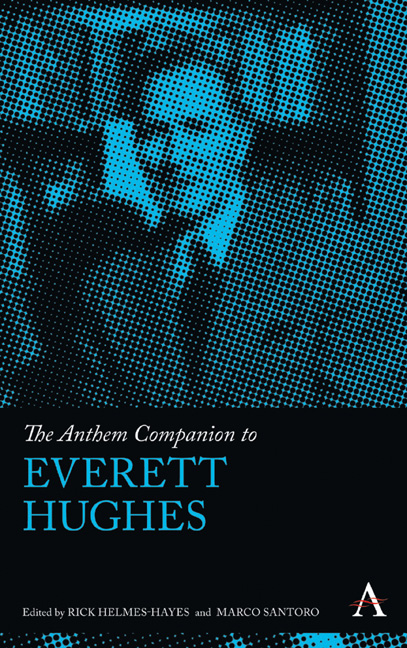Book contents
- Frontmatter
- CONTENTS
- List of Illustrations
- Foreword Everett C. Hughes, Great Teacher
- Insight through Craftsmanship: The Sociological Legacy of Everett Hughes
- Chapter One Everett Hughes and the Chicago Tradition
- Chapter Two Studying “Going Concerns”: Everett C. Hughes on Method
- Chapter Three The Natural History of Everett Cherrington Hughes: A Master of Fieldwork
- Chapter Four Everett C. Hughes: A Key Figure of the Canadian Chicago School Diaspora
- Chapter Five Everett Hughes: Notes from an Apprentice
- Chapter Six An American in Frankfurt: Everett C. Hughes's Unpublished Book on Germans after the End of the Nazi Regime
- Chapter Seven The Origins and Evolution of Everett Hughes's Concept: ‘Master Status’
- Chapter Eight Discovering the Secret of Excellence: Everett Hughes as a Source of Inspiration in Researching Creative Careers
- Chapter Nine Everett Hughes on Race: Wedded to an Antiquated Paradigm
- Notes on Contributors
- Index of Names
- Index of Subjects
Foreword Everett C. Hughes, Great Teacher
Published online by Cambridge University Press: 17 June 2017
- Frontmatter
- CONTENTS
- List of Illustrations
- Foreword Everett C. Hughes, Great Teacher
- Insight through Craftsmanship: The Sociological Legacy of Everett Hughes
- Chapter One Everett Hughes and the Chicago Tradition
- Chapter Two Studying “Going Concerns”: Everett C. Hughes on Method
- Chapter Three The Natural History of Everett Cherrington Hughes: A Master of Fieldwork
- Chapter Four Everett C. Hughes: A Key Figure of the Canadian Chicago School Diaspora
- Chapter Five Everett Hughes: Notes from an Apprentice
- Chapter Six An American in Frankfurt: Everett C. Hughes's Unpublished Book on Germans after the End of the Nazi Regime
- Chapter Seven The Origins and Evolution of Everett Hughes's Concept: ‘Master Status’
- Chapter Eight Discovering the Secret of Excellence: Everett Hughes as a Source of Inspiration in Researching Creative Careers
- Chapter Nine Everett Hughes on Race: Wedded to an Antiquated Paradigm
- Notes on Contributors
- Index of Names
- Index of Subjects
Summary
Everett Hughes, a great sociologist and a great teacher, may not be as unappreciated as the editors of this book suspect. His work continues to reverberate as new generations discover it for themselves. Equally important, more and more people discover, one way or another, that he didn't just inspire generations of later-to-become-prominent sociologists. He did better than that. He taught us ‘How to Do It’, just as his teacher Robert E. Park had taught an earlier generation (Hughes was one of them) how to do it. I always imagined, when I sat in Hughes's seminar, that he was reproducing, in his own style, the rambling, reflective, worldly, elegant style of thought and of imparting ideas that had characterized Park's teaching.
As fine a sociologist as Hughes was (and there has never been a better practitioner of our trade), he was even better as a teacher. I think that many people who sat through his classes would disagree with me. Many colleagues of mine in graduate school found his classes disagreeable: rambling, without a clear point, even tedious. The first class I took when I entered the University of Chicago Sociology Department in the fall of 1946 was his class in how to do fieldwork, taken by all the incoming students in sociology, anthropology and human development. He assigned us, in pairs, to Chicago census tracts (a small area of one or two Chicago blocks) and gave us assignments to do: collect genealogies from two or three people (a bow to the anthropologists, I suppose), observe for an hour or two in a public place, attend a group meeting of some kind and interview a number of people who lived in the area about whatever he (Hughes) happened to be interested in that quarter. And write down all this ‘information’ we collected and turn it in to him each class period – which we all dutifully did.
He didn't talk about that work in class. Instead he talked about any damn thing that came into his head, rambling in a contented way over things whose relevance to fieldwork wasn't clear. At least, it seemed that way to us. We were bewildered. I noticed that a number of much older students – typically guys who had been in the army and were now in graduate school as a result of the G.I.
- Type
- Chapter
- Information
- The Anthem Companion to Everett Hughes , pp. ix - xiiPublisher: Anthem PressPrint publication year: 2016

